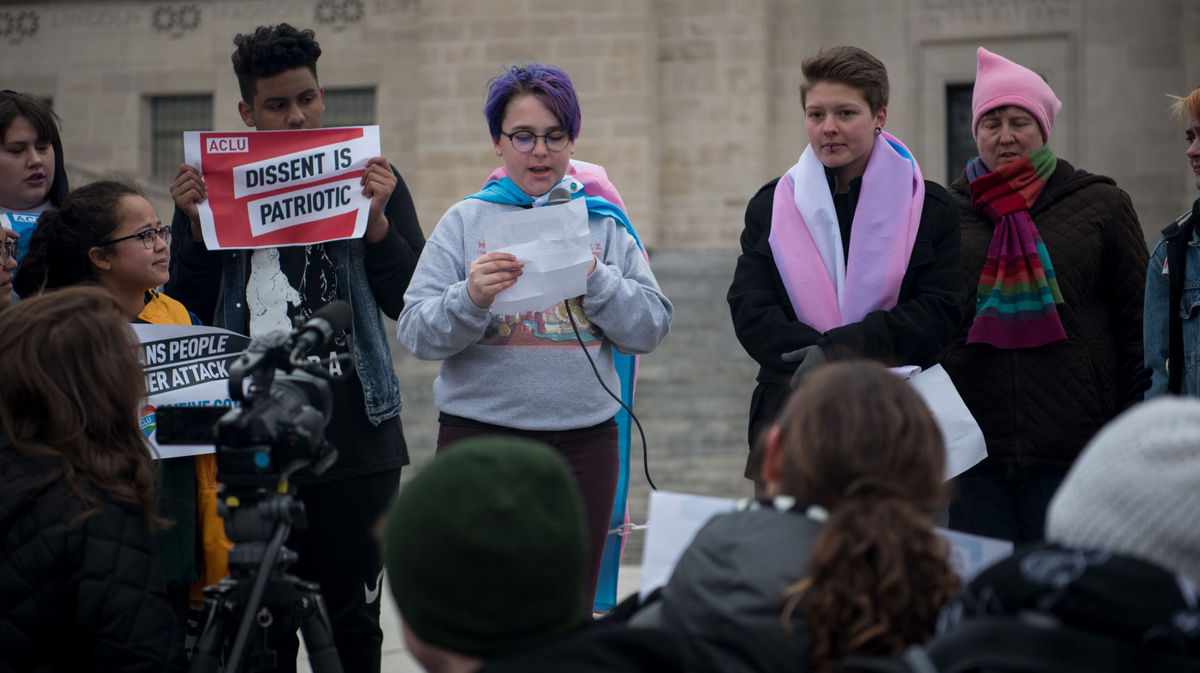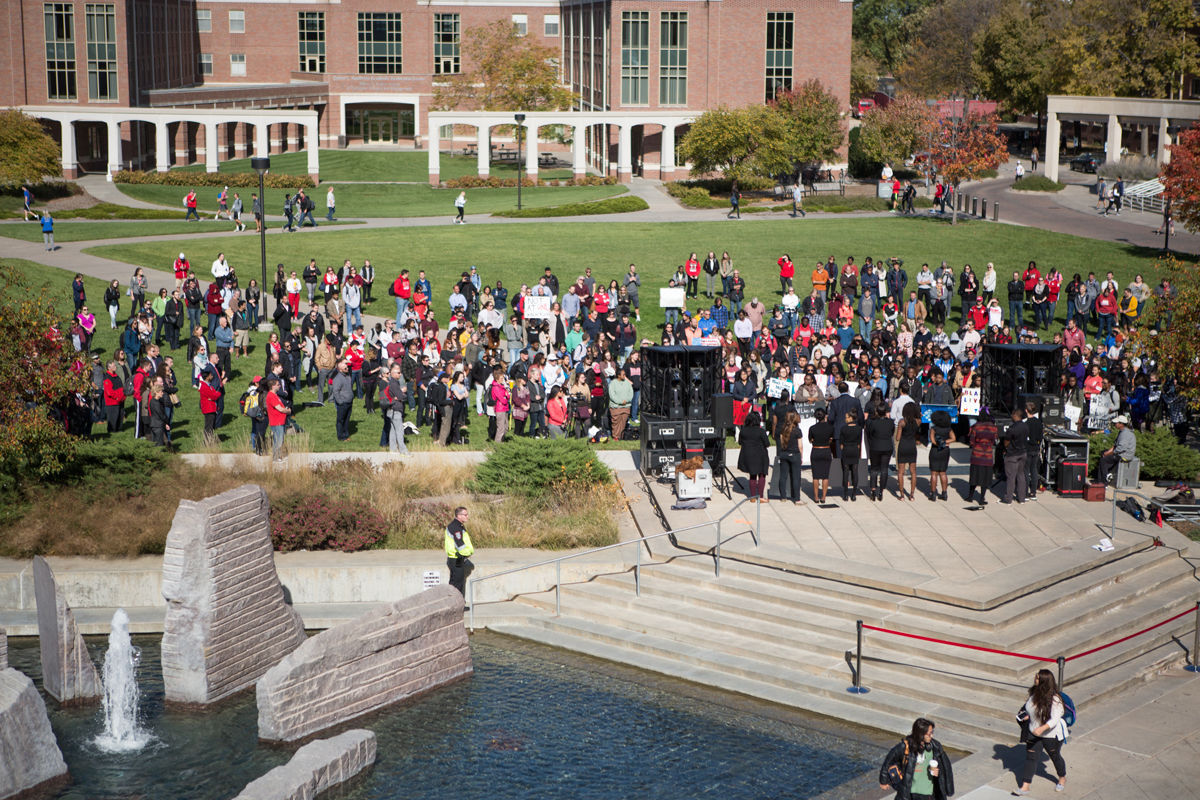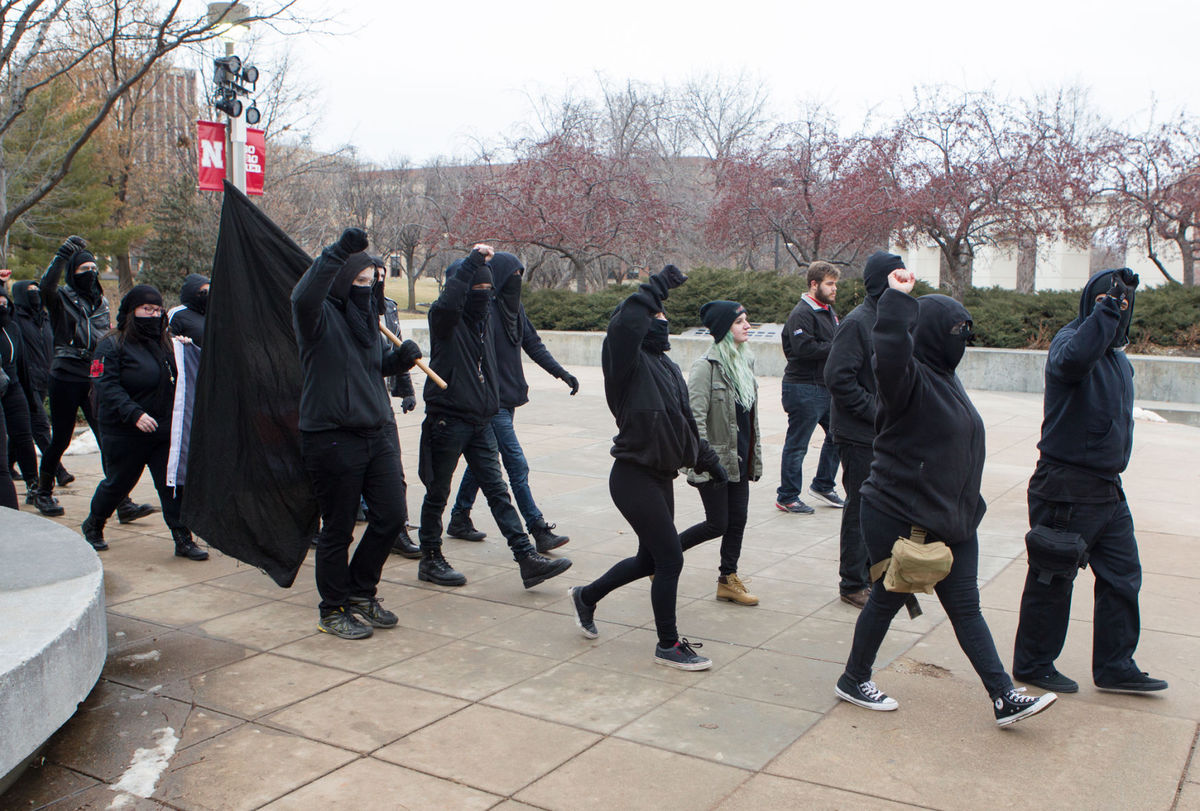

UNL's protected speech policies: not worst, not best in Big Ten
Three Nebraska football players’ decision to kneel during the national anthem of the Sept. 24, 2016 game against Northwestern sparked a movement at the University of Nebraska-Lincoln.
In the days and weeks after the game, students across campus reacted to the protest. Some created signs with phrases such as “Black Lives Matter” and “Solidarity” and “Stand Up for Black Lives.” More than 5,200 students signed a petition supporting the protest.
But on Oct. 21, 2016, the spark turned into a flame.
UNL students, faculty and staff gathered on the green space outside of the Nebraska Union for a Black Lives Matter rally. Several people spoke about issues such as alleged nationwide police brutality, and Michael Combs, a political science professor at UNL, talked about free speech.
“We allow our students to really believe in freedom of speech, as long as their speech is in conformity with what we think at this university,” Combs said at the rally. “I dare them to step forward and move outside their framework.”
This one action was able to turn into a movement that burned across campus. But at some universities, a protest like this might have been extinguished long before it could ignite.

Organizations like the Foundation for Individual Rights in Education, or FIRE, defend and sustain individual rights at America’s colleges and universities. But these basic rights are not always protected at every university, and FIRE believes the University of Nebraska-Lincoln is no exception.
FIRE rates colleges and universities as “red light,” “yellow light” or “green light” based on their protected policies and if they have the potential to inhibit protected speech or not. “Green light” institutions do not threaten free speech, “yellow light” schools have policies which could be interpreted to suppress protected speech and “red light” campuses clearly violate freedom of speech.
UNL received a “yellow light” rating in 2015 for its policies in the Student Code of Conduct, Rights and Responsibilities as a Resident, Use of Outdoor Spaces, Sexual Misconduct, Disciplinary Procedures and Bias Response.
Several other Big Ten universities have “yellow light” ratings, including Ohio State University, Northwestern University, Michigan State University, the University of Illinois at Urbana-Champaign, the University of Minnesota, Rutgers University, the University of Wisconsin, the University of Iowa and Indiana University.
According to FIRE, among Big Ten schools just two “green light” institutions exist and do not threaten free speech: Purdue University and the University of Maryland-College Park. Pennsylvania State University and the University of Michigan are considered “red light” campuses.
University Housing’s Rights and Responsibilities as a Resident policy state, “abuse (physical or verbal) and/or battery of a resident or staff member” can result in the termination of a student’s residence hall contract.
Samantha Harris, the vice president of policy reform at FIRE, said in an email that UNL is a “yellow light” campus because its policies are vague and susceptible to misuse.
“Because the term [verbal abuse] has no legal definition, it could mean anything from severely abusive and harassment speech to speech that merely causes hurt feelings,” Harris said.

A 1972 Supreme Court case is the perfect example of why “verbal abuse” earned UNL a “yellow light” rating, Harris said. The Supreme Court held in Gooding v. Wilson that a Georgia statute prohibiting “abusive language” was unconstitutional because that term encompassed speech and expression protected by the First Amendment.
Keith Zaborowski, the associate director of residence life at UNL, said to his knowledge, no student has had their housing contract terminated based on speech.
“It really has not been an issue,” he said. “As long as it isn’t against the law or university policy, there isn’t a problem.”
What students place on the outside of their dorm doors is more of a concern for Zaborowski. He said some students place items or images on their dorm doors that could offend or make others feel targeted.
In one case, he said two students placed Confederate flags on their doors, which made several others on the floor uncomfortable. After a conversation with both of the students about how the flag might make other students feel, one student removed the flag, but the other one did not.
“Our job is to make sure that everyone feels included,” Zaborowski said. “But we never made them take it down.”
He said for the most part, students have been respectful of each other and he doesn’t view the policy as being a violation of students’ First Amendment rights.
The Facilities Maintenance and Operations Use of Outdoor Spaces policy at UNL states “student organizations need to obtain approval for outdoor activities through the Office for Student Involvement.” Harris said this policy earned a “yellow light” because it requires prior approval for all outdoor activities.
“Universities need to allow students to engage in spontaneous protest and demonstration on campus,” she said.
Charlie Francis, the director of Nebraska Unions, said he’s never had any problems with registered student organizations getting permission to use the plaza space in front of the Union. He also added that anytime a group is planning a rally, such as the Black Lives Matter rally that took place in fall of 2016, the groups almost always ask for permission first.
When student groups ask for permission before a rally, he said Unions can work with groups such as Landscape Services and the UNL Police Department.
“We try to help students be as successful as possible,” Francis said.
However, Francis said groups wouldn’t be punished for using the outdoor space without permission.
For example, traveling preachers can sometimes be seen demonstrating outside of the Nebraska Union. He said most of them do not notify Unions before coming to campus, but the University hasn’t taken any steps to remove them.
If UNL brings all of its “yellow light” policies in line with the First Amendment, Harris said the University can become a “green light” campus again, and she said FIRE would be happy to work with UNL administration to make these changes. But according to both Zaborowski and Francis, there is no indication UNL is interested in changing its policies anytime soon.
Harris said these vague policies might seem like a small problem, but they can lead to much bigger First Amendment right violations.
“Having a green light [campus]... sends a strong signal to students and faculty that the university values open expression and will defend the right to free speech,” Harris said. “The freedom to discuss a wide range of ideas is critical to the mission of a university.”